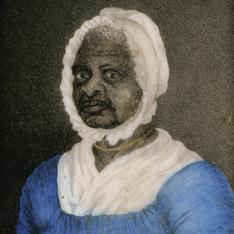EARLY WINTER CALENDAR
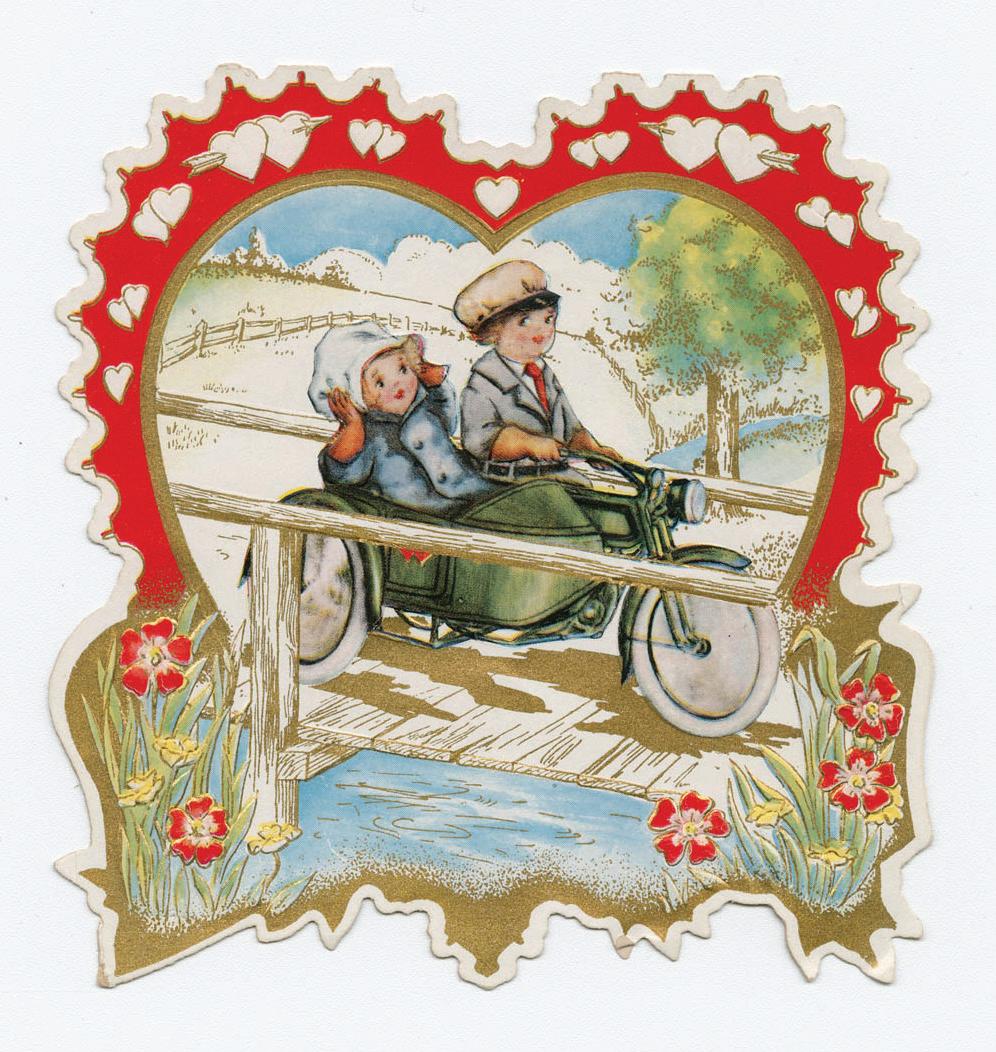
2023
LOCATION & CONTACT

Massachusetts Historical Society 1154 Boylston Street Boston, MA 02215
VISITOR INFORMATION
MHS galleries and library are open: Monday, and Wednesday through Friday, from 10:00 AM to 4:45 PM Tuesday from 10:00 AM to 7:45 PM Saturday from 10:00 AM to 3:00 PM
Please note that the last admission for exhibition visitors will be 45 minutes prior to closing. Learn more about our virtual and in-person offerings at www.masshist.org/visit.
Researchers are strongly encouraged to request an appointment. Learn more at www.masshist.org/library.
Tel: 617.536.1608 | Fax: 617.859.0074 www.masshist.org FOLLOW US @MHS1791 @MassachusettsHistoricalSociety

Cover: Valentine’s Day card with drawing of two figures in a car, by Whitney Made, Worcester, Mass., circa 1920s.

2
The MHS offers an engaging roster of events, author talks, panel discussions, brown-bag lunches, and seminars. For a complete schedule and more information, visit www.masshist.org/events.
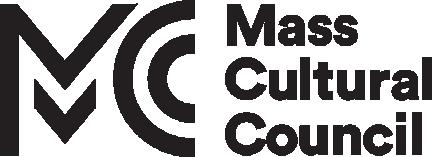
RSVP Information PAGE 4
Early Winter Programs at a Glance PAGE 5
Early Winter Program Descriptions PAGE 7
EARLY WINTER PROGRAMS
Generous support provided by
3
Visitor Information
MHS galleries and library are open Monday, and Wednesday through Friday, from 10:00 AM to 4:45 PM; Tuesday from 10:00 AM to 7:45 PM; and Saturday from 10:00 AM to 3:30 PM.
Please note that the last admission for exhibition visitors will be 45 minutes prior to closing. Learn more at www.masshist.org/visit.
Researchers are strongly encouraged to request an appointment. Visit www.masshist.org/library for more information.
RSVP Information
Visit www.masshist.org/events for additional event information, updates, cancellations, and registration.
Hybrid programs and seminars occur in person and virtually, so be sure to register how you will attend. Please note that events listed as “hybrid program” have a reception that begins 30 minutes prior to the program start time. Face masks are optional inside the building. Please visit www.masshist.org/ COVID-protocols to find the most up-to-date information.
EVENTS, AUTHOR TALKS, AND SERIES
For more information or to register visit www.masshist.org/events.
WORKSHOPS
Visit www.masshist.org/teaching-history for more information. Register online at www.masshist.org/events.
BROWN-BAG LUNCH PROGRAMS
Brown-bags provide an informal opportunity for visiting researchers to discuss their work, field questions, and receive new ideas. Please visit www.masshist.org/events for more information or to register for an online brown-bag.
SEMINARS
Seminars bring together a diverse group of scholars and members of the public to workshop a precirculated paper. After brief remarks from the author and an assigned commentator, the discussion is opened to the floor. There is a subscription fee for advance access to supporting materials. For more information, please visit www.masshist.org/research/seminars; register online at www.masshist.org/events.
Past Programs
If you missed a program, would like to revisit the material presented, or are interested in viewing past programs, visit www.masshist.org/video. A selection of past programs is just a click away.
4
9 MONDAY | 6:00 | HYBRID PROGRAM
Democratic Justice: Felix Frankfurter, the Supreme Court & the Making of the Liberal Establishment
Brad Snyder, Georgetown Law
In-person reception begins at 5:30 PM. Free for MHS Members. $10 per person (in person). No charge for virtual or Card to Culture participants.
10 TUESDAY | 5:00 | VIRTUAL SEMINAR
“Physicians advise the use of it”: Chinese Tea in Early America
Yiyun Huang, University of Tennessee, Knoxville
Comment: Rebecca Tannenbaum, Yale University
11 WEDNESDAY | 6:00 | HYBRID PROGRAM
Uniting America: How FDR & Henry Stimson Brought Democrats & Republicans Together to Win World War II Peter Shinkle
In-person reception begins at 5:30 PM. Free for MHS Members. $10 per person (in person). No charge for virtual or Card to Culture participants.
12 THURSDAY | 5:00 | HYBRID SEMINAR
If Wishes Were Sources: Speculation & the Saga of James Bradley, Oberlin’s “First” Black Student
John Frederick Bell, Assumption University
Comment: Julie Winch, University of Massachusetts , Boston
18 WEDNESDAY | 6:00 | HYBRID PROGRAM
No Right to an Honest Living: The Struggles of Boston’s Black Workers in the Civil War Era
Jacqueline Jones, University of Texas at Austin
In-person reception begins at 5:30 PM.
Free for MHS Members. $10 per person (in person). No charge for virtual or Card to Culture participants.
24 TUESDAY | 5:00 | HYBRID SEMINAR
The Witchmaster of the Waxhaws: Joshua Gordon’s “Witch Book”
Roark Atkinson, Ramapo College of New Jersey; and Douglas Winiarski, University of Richmond Comment: Kenneth Minkema, Yale University
25
WEDNESDAY | 6:00 | HYBRID PROGRAM
MHS Speakers Fund
Jessie Little Doe Baird
In-person reception begins at 5:30 PM. Free for MHS Members. $10 per person (in person). No charge for virtual or Card to Culture participants.
26 THURSDAY | 5:00 | VIRTUAL SEMINAR
“To make or frame curious Figures in Wax-work”: Nostalgia & the Miniature in 18th-Century Women’s Work
Laura Earls, Universtiy of Delaware Comment: Miriam S. Rich, Dartmouth College
30
MONDAY | 6:00 | VIRTUAL PROGRAM
Film Discussion: The Last of the Winthrops Viviane Winthrop
31 TUESDAY | 5:00 | HYBRID SEMINAR
The Influence of King Philip’s War on American Political Thought Daniel Mandell, Truman State University Comment: Owen Stanwood, Boston College
February 2
THURSDAY | 5:00 | VIRTUAL EVENT
Difficult Subjects: How to Handle Them? Benjamin Anastas, Bennington College; Linda Hirschman, independent scholar; and Alec Nevala-Lee, biographer Moderator: Megan Marshall, Emerson College
EARLY WINTER PROGRAMS AT A GLANCE
5 January
6
TUESDAY | 6:00 | HYBRID PROGRAM
Master Slave Husband Wife: An Epic Journey from Slavery to Freedom Ilyon Woo
In-person reception begins at 5:30 PM.
Free for MHS Members. $10 per person (in person). No charge for virtual or Card to Culture participants.
7
TUESDAY | 5:00 | HYBRID SEMINAR
America’s First Corporate Person: The Bank of the United States, 1789 -1812 Jared S. Berkowitz, Brandeis University
Comment: Christine Desan, Harvard Law School
8 WEDNESDAY | 6:00 | VIRTUAL PROGRAM
Disability & the American Past: Disappeared Disabilities
Beth Linker, University of Pennsylvania; Mara Mills, New York University; and Leroy Moore, Krip-Hop Nation
Moderator: Ola Ojewumi, Project ASCEND
13 MONDAY | 6:00 | VIRTUAL PROGRAM
Disability & the American Past: Failures in Intersectionality
Keith Jones, SoulTouchin’ Experiences; Susan Burch, Middlebury College; and Anita Cameron, Not Dead Yet
Moderator: Octavian Robinson, Gallaudet University
14 TUESDAY | 1:30 | IN-PERSON GALLERY TALK
My Dear Friend
Sara Martin, Adams Papers Editor in Chief
16 THURSDAY | 5:00 | HYBRID SEMINAR
Living with Climate Change in Northern New England
Emma C. Moesswilde, Georgetown University
Comment: Christopher M. Parsons, Northeastern University
20 MONDAY | 9:00 | VIRTUAL WORKSHOP
Part 1: Teaching the U.S. Disability Rights Movement
In partnership with Emerging America $25 per educator for all three parts.
21 TUESDAY | 5:00 | HYBRID SEMINAR
“May It Please Her Honor”: The United States’ First Women Judges, 1870 -1960 Elizabeth D. Katz, Washington University School of Law Comment: Virginia Drachman, Tufts University
22 WEDNESDAY | 9:00 | VIRTUAL WORKSHOP
Part 2: Teaching the U.S. Disability Rights Movement
In partnership with Emerging America $25 per educator for all three parts.
23 THURSDAY | 5:00 | VIRTUAL SEMINAR
Digital Methods for Understanding Historical Travel Guides: A Case Study of the Methodologies Behind Mapping the Gay Guides
Amanda Regan, Clemson University Comment: Alex Ketchum, McGill University
24 FRIDAY | 9:00 | VIRTUAL WORKSHOP
Part 3: Teaching the U.S. Disability Rights Movement
In partnership with Emerging America $25 per educator for all three parts.
28 TUESDAY | 6:00 | VIRTUAL PROGRAM
Disability & the American Past: Intro to Disability Justice
Ellice Patterson, Abilities Dance; Jorge Matos Valldejuli, Hostos Community College at the City University of New York; and Britney Wilson, New York Law School
Moderator: Jessica Cowing, The College of Wooster
6
Founded in 1791, the MHS is an invaluable resource for American history, life, and culture. Our extraordinary collections tell the story of America through millions of rare and unique documents, artifacts, and irreplaceable national treasures. Please check the website for updates and, once registered, your e-mail before attending the program.
JANUARY 9 MONDAY | 6:00 | HYBRID PROGRAM
Democratic Justice: Felix Frankfurter, the Supreme Court & the Making of the Liberal Establishment Brad Snyder, Georgetown Law
Scholars have portrayed Felix Frankfurter as a judicial failure, a liberal lawyer turned conservative justice, and the Warren Court’s principal villain. Brad Snyder argues that none of these characterizations ring true. A pro-government, pro-civil rights liberal who rejected shifting political labels, Frankfurter advocated for judicial restraint he believed that people should seek change not from the courts but through the democratic political process. He knew American presidents from Theodore Roosevelt to Lyndon Johnson and inspired his students and law clerks to enter government service. Organized around presidential administrations and major political and world events, this definitive biography chronicles Frankfurter’s impact on American life. This is a hybrid event. The in-person reception begins at 5:30 PM.
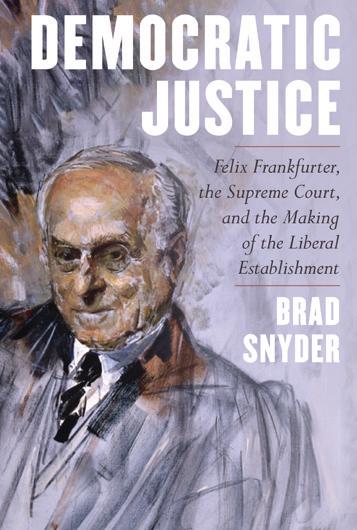
To reserve: FREE for MHS Members. $10 per person fee (in person). No charge for virtual attendees or Card to Culture participants (EBT, WIC, and ConnectorCare). Please register at www.masshist.org/events.
JANUARY 10 TUESDAY | 5:00 | HYBRID SEMINAR
Pauline Maier Early American History Seminar
“Physicians advise the use of it”: Chinese Tea in Early America
Yiyuan Huang, University of Tennesse, Knoxville
Comment: Rebecca Tannenbaum, Yale University
This paper explains how and why early Americans came to believe Chinese tea had healing powers. Huang argues that eighteenth-century colonial merchants and libraries paved the way for this popular belief by establishing intellectual and market-oriented pathways. These pathways facilitated the cultural transfer of Chinese ideas about tea’s medicinal properties. The transfer of these ideas made Chinese tea popular in North America among a cross section of colonial society. This is a hybrid event. The in-person reception begins at 4:30 PM.
To reserve: Please register at www.masshist.org/events.
7
DESCRIPTIONS
EARLY WINTER PROGRAM
JANUARY 11 WEDNESDAY | 6:00 | HYBRID
PROGRAM
Uniting America: How FDR & Henry Stimson Brought Democrats & Republicans Together to Win World War II
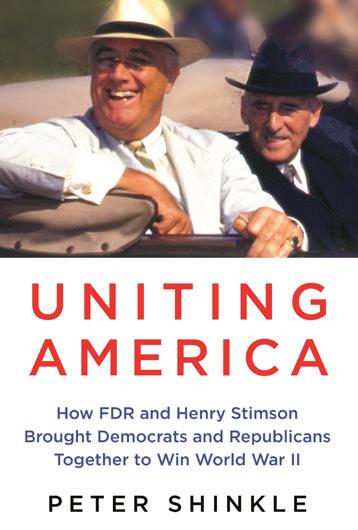
Peter Shinkle
On 20 June 1940, FDR shocked the country by announcing that two Republicans would take posts in his cabinet. Henry Stimson, former President Herbert Hoover’s secretary of state, became secretary of war, and Frank Knox, the Republican vice-presidential candidate in 1936, became secretary of the navy. Roosevelt intended the appointments to build national unity. It also placed a bipartisan relationship at the center of America’s confrontation with global fascism. FDR’s Republican allies went on to play critical roles in leading the war effort, and many bills passed Congress during the war years with backing from both parties. Following Roosevelt’s death, Stimson continued to champion bipartisanship under President Truman in the closing chapter of the war. This alliance stands as a historic example of united leadership in a nation scarred by political division. In Uniting America, Peter Shinkle paints a full portrait of this extraordinary collaboration. This is a hybrid event. The in-person reception begins at 5:30 PM.
To reserve: FREE for MHS Members. $10 per person fee (in person). No charge for virtual attendees or Card to Culture participants (EBT, WIC, and ConnectorCare). Please register at www.masshist.org/events.
JANUARY 12 THURSDAY | 5:00 |
HYBRID SEMINAR
African American History Seminar
If Wishes Were Sources: Speculation & the Saga of James Bradley, Oberlin’s “First” Black Student
John Frederick Bell, Assumption University
Comment: Julie Winch, University of Massachusetts, Boston
James Bradley was not the first African American to study at Oberlin College, but chroniclers and historians of abolition have long mistaken the facts of his life. This essay reinterprets the available evidence, not simply to correct the record but to critique the appropriation of freed people’s life narratives in antislavery storytelling. Scholars of slavery have shown the value of fabulation or speculation for addressing omissions and suppressions of enslaved voices in the archive. Bradley’s case suggests that the inverse can also be true, that endeavoring to fill gaps in the stories of freed people can reproduce harm rather than redress it. This is a hybrid event. The in-person reception begins at 4:30 PM.
To reserve: Please register at www.masshist.org/events.
8
18 WEDNESDAY | 6:00 | HYBRID PROGRAM
No Right to an Honest Living: The Struggles of Boston’s Black Workers in the Civil War Era Jacqueline Jones, University of Texas at Austin
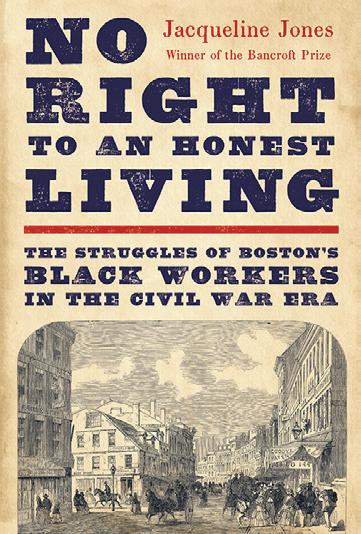
In No Right to an Honest Living, Jacqueline Jones reveals how Boston was the United States writ small: a place where the soaring rhetoric of egalitarianism was easy, but justice in the workplace was elusive. Before, during, and after the Civil War, white abolitionists and Republicans refused to secure equal employment opportunity for Black Bostonians, condemning many of them to poverty. Still, Jones finds, some Black entrepreneurs created their own jobs and forged their own career paths. Highlighting the everyday struggles of ordinary Black workers, this book shows how injustice in the workplace prevented Boston and the United States from securing true equality for all. This is a hybrid event. The in-person reception begins at 5:30 PM.
To reserve: FREE for MHS Members. $10 per person fee (in person). No charge for virtual attendees or Card to Culture participants (EBT, WIC, and ConnectorCare). Please register at www.masshist.org/events.
JANUARY 24 TUESDAY | 5:00 | HYBRID SEMINAR
L. Dennis Shapiro and Susan R. Shapiro Digital History Seminar
The Witchmaster of the Waxhaws: Joshua Gordon’s “Witch Book”
Roark Atkinson, Ramapo College of New Jersey, and Douglas Winiarski, University of Richmond
Comment: Kenneth Minkema, Yale University
Among the best known yet least understood occult texts in early America, Joshua Gordon’s “Witchcraft Book” reveals a stunning culture of Scots-Irish folk medicine, cunning magic, and witch hunting that flourished in the backcountry settlements of the Carolinas at the turn of the nineteenth century. Combing through land records and other social history documents, Douglas Winiarski reconstructs Gordon’s family history and the backcountry Carolina community in which his spellbook was created and deployed. In so doing he creates an interactive digital map of Gordon’s plantation near modern-day Charlotte, which Gordon leased from the Catawba Nation. Roark Atkinson traces Gordon’s spells back to their European antecedents and identifies cross cultural exchanges between Scots-Irish, German settlers, and Native Americans. He also recovers a larger cultural context for the manuscript that encompasses the practices of enslaved African sorcerers. Through painstaking querying of various electronic databases, Atkinson reveals surprising connections between the manuscript and transatlantic print culture. This is a hybrid event. The inperson reception begins at 4:30 PM.
To reserve: Please register at www.masshist.org/events.
9
JANUARY
EARLY
PROGRAM DESCRIPTIONS
WINTER
Disability and the American Past
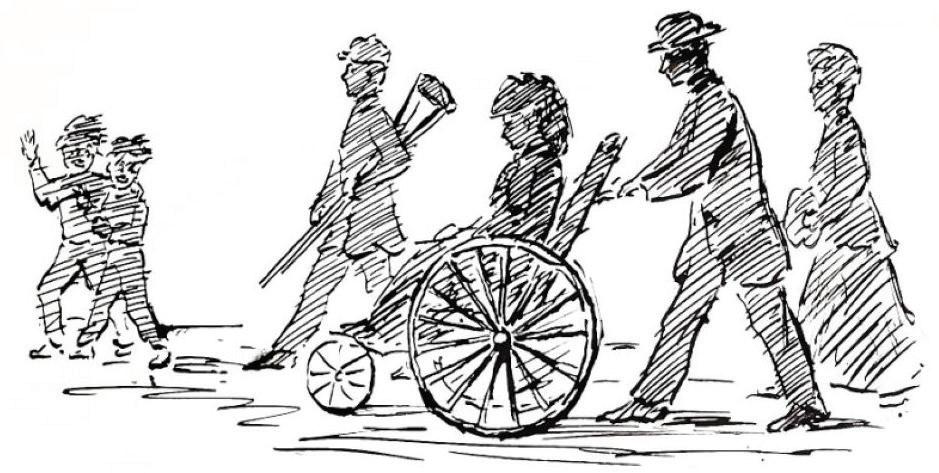
Through panel conversations, presentations, workshops, and discussion, we introduce the field of disability history, investigate some major research areas in the field such as activism, material culture, medical history, technology, and citizenship, and provide a forum to examine new, emerging scholarship.
February 8 | 6:00 PM: Disappeared Disabilities, with Beth Linker, University of Pennsylvania; Mara Mills, New York University; Leroy Moore, Krip-Hop Nation; and moderated by Ola Ojewumi, Project ASCEND.
February 13 | 6:00 PM: Failures in Intersectionality, with Keith Jones, SoulTouchin’ Experiences; Susan Burch, Middlebury College; Anita Cameron, Not Dead Yet; and moderated by Octavian Robinson, Gallaudet University.
February 20, 22, and 24 | 9:00 to 11:30 AM: TeachingtheU.S.DisabilityRightsMovement, in partnership with Emerging America. $25, Open to all K-12 educators.
February 28 | 6:00 PM: Intro to Disability Justice, with Ellice Patterson, Abilities Dance; Jorge Matos Valldejuli, Hostos Community College at the City University of New York; Britney Wilson, New York Law School; and moderated by Jessica Cowing, The College of Wooster.
March 6 | 6:00 PM: Disability Activism in Massachusetts and Nationwide, with Colin Killick, Disability Policy Consortium; Cheryl Cumings, Our Space, Our Place, Inc.; Maria Palacios, Sins Invalid; and moderated by Lydia X. Z. Brown, Autistic People of Color Fund.
Note on accessibility: All online programs are in English and have closed captioning enabled through Zoom. The panel discussions have ASL interpreters. If you have questions about accessibility, please contact programs@masshist.org.
Register at www.masshist.org/events.
10
JANUARY 25 WEDNESDAY | 6:00 |
HYBRID PROGRAM
Wôpanâak Language Reclamation Project: MHS Speakers Fund
Featuring Jessie Little Doe Baird Jessie Little Doe Baird
Jessie Little Doe Baird has led the effort to bring back to the Wampanoag people the language once spoken by their ancestors. This path-blazing work, which Ms. Baird has now pursued for decades with colleagues across the Wampanoag Nation, began with the Wôpanâak Language Reclamation Project formation, which is reclaiming the language. In a journey that began as a vision, Ms. Baird earned an advanced degree in linguistics at MIT and initiated the creation of vast resources needed for the work of language reclamation. Her work earned her a MacArthur Genius Award Fellowship from the MacArthur Foundation in 2010. Ms. Baird has also served as vice-chairwoman of the Mashpee Wampanoag Tribal Council and was awarded an honorary Doctorate in Social Sciences from Yale University. This is a hybrid event. The in-person reception begins at 5:30 PM.
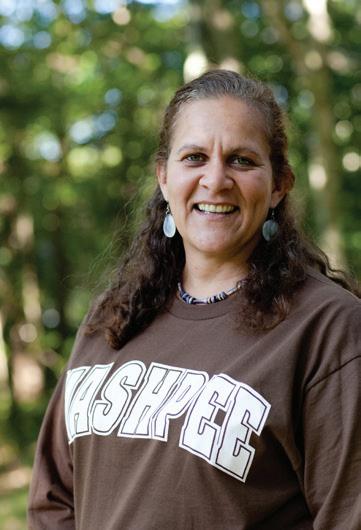
To reserve: FREE for MHS Members. $10 per person fee (in person). No charge for virtual attendees or Card to Culture participants (EBT, WIC, and ConnectorCare). Please register at www.masshist.org/events.
JANUARY 26 THURSDAY | 5:00 |
VIRTUAL SEMINAR
History of Women, Gender, & Sexuality
Seminar
“To make or frame curious Figures in Wax-Work”: Nostalgia & the Miniature in 18th-Century Women’s Work
Laura Earls, University of Delaware
Comment: Miriam Rich, Dartmouth College
Elite white women in the British Atlantic world commemorated transitions in their lives with shellwork grottos, shadow box scenes, dollhouses, and dolls. While these objects usually marked marriages or the births of children, they often did not depict these milestones. This dissertation chapter uses scholarship on folklore and women’s life-writing practices
MHS Speakers Fund
The MHS Speakers Fund supports talks with leading scholars of American history who advance the mission of the Society by nationally contributing to a deeper public understanding of the American experience. The MHS Speakers Fund was started by the generous gifts of Charlie and Kitty Ames.
11
EARLY WINTER PROGRAM DESCRIPTIONS
to assess how and why women in Boston, Philadelphia, and London created these material memoirs. Close readings of these objects illuminate the connections between women’s work, women’s bodies, and nostalgia because these things omit the sexual and racial power dynamics that shaped the lived experiences of their creators. This is an online event.
To reserve: Please register at www.masshist.org/events.
JANUARY 30 MONDAY | 6:00 | VIRTUAL PROGRAM
Film Discussion: The Last of the Winthrops Viviane Winthrop
The Last of the Winthrops explores the powerful revelations of a woman who reclaims her sense of self after taking an Ancestry DNA test. Initially, she must learn the truth that her father, Reginald Winthrop, who could trace his heritage to the founders of America, is not her biological father. After she is contacted by an unknown relative as a result of their Ancestry DNA tests, Viviane embraces her new identity. She is able to find peace after facing powerful themes about love, blood, and family. Join Viviane Winthrop for a discussion of the film and her path to find her ancestry. Registrants will be sent a link to view the film prior to the program. This is an online event.

To reserve: Please register at www.masshist.org/events.
JANUARY 31 TUESDAY | 5:00 | HYBRID SEMINAR
The Influences of King Philip’s War on American Political Thought
Daniel
Mandell, Truman State University
Comment: Owen Stanwood, Boston College
This paper is a chapter on the short and long-term influences of King Philip’s War for A New History of American Political Thought, including primary sources and analysis. Daniel Mandell emphasizes four main elements: victories or defeats reflected God’s blessings or punishment; Native Americans were more likely to be regarded as inherently hostile and vicious; New Englanders increasingly hallowed their Puritan founders, touted the region’s virtues, and embraced Britain’s leadership of the Protestant world; and memories of the war would continue to shape New England’s perceptions of larger events including Jacksonian Indian Removal and the Civil War. This is a hybrid event. The in-person reception begins at 4:30 PM.
To reserve: Please register at www.masshist.org/events.
12
FEBRUARY 2 THURSDAY | 5:00 | VIRTUAL SEMINAR
New England Biography Series
Difficult Subjects: How to Handle Them?
Benjamin Anastas, Bennington College; Linda Hirschman, independent scholar; and Alec Nevala Lee, biographer
Moderator: Megan Marshall, Emerson College
What’s a biographer to do when a subject goes rogue? Turns unlikable or unreliable? Or just plain disappoints an admiring writer? Join three biographers who have taken this journey with their subjects and come out the other side with magnificent biographical works for a discussion of the unexpected dilemmas they faced while writing about twentieth century diarist Claude Fredericks (Anastas), self-made futurist Buckminster Fuller (Nevala-Lee), and abolitionist Maria Weston Chapman, along with William Lloyd Garrison and Frederick Douglass (Hirshman). This is an online event.
To reserve: Please register at www.masshist.org/events.
FEBRUARY 6 MONDAY | 6:00 | HYBRID PROGRAM
Master Slave Husband Wife: An Epic Journey From Slavery to Freedom Ilyon Woo
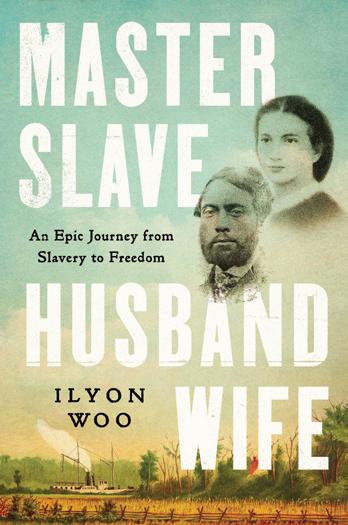
In 1848, a young, enslaved couple, Ellen and William Craft, achieved one of the boldest feats of self-emancipation in American history. Posing as master and slave, they made their escape together across more than 1,000 miles, riding out in the open on steamboats, carriages, and trains that took them from bondage in Georgia to the free states of the North. The tale of their adventure soon made them celebrities, and the couple traveled another 1,000 miles, drawing thunderous applause as they spoke alongside abolitionist luminaries of the day. But even then, they were not out of danger. With the passage of the Fugitive Slave Act in 1850, all Americans became accountable for returning refugees to slavery, forcing the Crafts to flee once again this time from the United States. This is a hybrid event. The in-person reception begins at 5:30 PM.
To reserve: FREE for MHS Members. $10 per person fee (in person). No charge for virtual attendees or Card to Culture participants (EBT, WIC, and ConnectorCare). Please register at www.masshist.org/events.
13
EARLY
PROGRAM DESCRIPTIONS
WINTER
FEBRUARY 7 TUESDAY |
5:00
| HYBRID SEMINAR
Pauline Maier Early American History Seminar
America’s First Corporate Person: The Bank of the United States, 1789-1812
Jared S. Berkowitz, Brandeis University
Comment: Christine Desan, Harvard Law School
The traditional narrative of corporate personhood begins in the Gilded Age, as railroad corporations permeated federal courts to challenge state regulations, leading us to assume that personhood was always a source of power for private associations. However, this paper argues that the founding of the Bank of the United States (BUS) reveals a dramatically different story. For most of the 19th century, legal personhood was a corporation’s most vulnerable attribute. The tumultuous career of the BUS provided American judges with the opportunity to craft a unique law of corporations one that personified the institution while reckoning with republican ideology to support an emerging capitalist economy. This is a hybrid event. The in-person reception begins at 4:30 PM.
To reserve: Please register at www.masshist.org/events.
FEBRUARY 8 WEDNESDAY | 6:00 | VIRTUAL PROGRAM
Disability and the American Past: Disappeared Disabilities
Beth Linker, University of Pennsylvania; Mara Mills, New York University; Leroy Moore; Krip-Hop Nation
Moderator: Ola Ojewumi, Project ASCEND
When the history of people with disabilities is discussed, the same names pop up: figures like Helen Keller or Franklin D. Roosevelt. However, accounts of Sojourner Truth and Harriet Tubman’s activism have often failed to mention their disabilities or consider how their disability affected their work and lives. Drawing from her forthcoming book, Slouch, Beth Linker demonstrates how John F. Kennedy’s disabling back pain, while often hidden from the public eye, advanced the medicalization of the condition, but did little to advance the rights and protections of the growing number of US citizens who experienced a similar debility. Referencing her research in the Thomas Edison archives, Mills will discuss myths about Edison’s relationship to assistive technology, as well as the value of the collection for disability history, given the extensive correspondence from deaf and hard of hearing contemporaries. Leroy Moore will talk about the individuals featured in his book, Black Disabled Ancestors, and what their stories can teach us today. Ola Ojewumi will then lead panelists in a discussion about the effects of the erasure of disability in history, efforts to reframe this history, and how the disabilities of politicians to activists have informed their actions that changed history. This is an online event.
To reserve: Please register at www.masshist.org/events.
14
FEBRUARY 13 MONDAY | 6:00 | VIRTUAL
PROGRAM
Disability and the American Past: Failures in Intersectionality
Keith Jones, SoulTouchin’ Experiences; Susan Burch, Middlebury College; and Anita Cameron, Not Dead Yet
Moderator: Octavian Robinson, Gallaudet University
In America’s long twnentieth-century civil rights movements histories, disabled people and especially BIPOC and LGBTQ+ disabled people are often erased. And in the prominent stories told of America’s disability rights movements, activists’ work and key issues usually have centered on comparatively privileged people: white, college-educated, CIS gendered, heteronormative, and physically disabled individuals. This panel offers intersectional critique and counter stories. Keith Jones, activist and founder of SoulTouchin’ Experiences, Anita Cameron, director of Minority Outreach at Not Dead Yet, and disability and deaf cultural historian Susan Burch will reflect upon the limits of US disability rights movement’s strategies and histories, as well as the efforts by disabled people living at the intersection of multiple marginalizations and oppressions to create a more just and inclusive world. They will discuss the uneven impact and incomplete legacy of disability rights movements to date, the emergence of disability justice work, and the possible disability histories ahead of us. This is an online event.
To reserve: Please register at www.masshist.org/events.
FEBRUARY 14 TUESDAY | 1:30 | IN-PERSON GALLERY TALK
My Dearest Friend
Sara Martin, Adams Papers Editor in Chief
Learn more about the courtship correspondence of Abigail Smith and John Adams, and view a selection of their letters on display.
FEBRUARY 16 THURSDAY | 5:00 |
HYBRID SEMINAR
Environmental History Seminar
Living with Climate Change in Northern New England Emma C. Moesswilde, Georgetown University
Comment: Christopher M. Parsons, Northeastern University
In the early modern centuries, natural variabilities in Earth’s climate disrupted the seasonal rhythms that governed landscapes and livelihoods in the Northern Atlantic world. This paper uncovers the impacts of and responses to the changing meteorological and material realities of seasons in rural New England communities. Emma C. Moesswilde’s
15
EARLY WINTER PROGRAM DESCRIPTIONS
research explores how farmers and fishers have long responded flexibly and creatively to climate change. She contends that living with variable climate change on seasonal scales facilitated multiscalar adaptations across rural agroecologies, which can provide new perspectives on how rural populations can adapt to global warming today. This is a hybrid event. The in-person reception begins at 4:30 PM.
To reserve: Please register at www.masshist.org/events.
FEBRUARY 20 MONDAY | 9:00 TO 11:30 | VIRTUAL TEACHER WORKSHOP
Part 1: Teaching the U.S. Disability Rights Movement
In partnership with Emerging America
What strategies has the disability rights movement used to make lasting changes to laws and society? How have activists advocated for justice, equal opportunities, and reasonable accommodations through history and in the present time? In partnership with Emerging America, the MHS offers a virtual teacher workshop that introduces the broad scope of more than 250 years of disability rights activism, from the historical roots of the movement to present-day strategies. Emerging America will introduce their newly piloted Reform to Equal Rights: K-12 Disability History Curriculum. In this three-part workshop, educators will engage with rich primary sources that center the voices of people with disabilities and will be equipped with strategies for bringing these important stories into the classroom. We will also be joined by local disability rights activists who will share their own work to enact change in their communities. Part two will take place on February 22 and part three on February 24. This is an online event.
This program is open to all who work with K-12 students. Teachers can earn either 22.5 PDPs or one graduate credit with Worcester State University (for an additional fee). This event will take place virtually and will be presented in English with English auto-generated captioning, and ASL translation and live captioning are available upon request during registration (please place requests for captioning or translation by February 5).
To reserve: Please register at www.masshist.org/events.
FEBRUARY 21 TUESDAY | 5:00 | HYBRID SEMINAR
History of Women, Gender, & Sexuality Seminar
“May It Please Her Honor”: The United States’ First Women Judges, 1870-1960
Elizabeth D. Katz, Washington University School of Law
Comment: Virginia Drachman, Tufts University
Between 1870 and 1960, at least 120 women served as judges in the United States. At the time of their service, these pathbreakers attracted significant attention because they seemed to embody the promise and perils of women’s increasing political and professional
16
power. Today nearly all are forgotten. This project provides the most comprehensive account of the country’s first women judges, unearthing the obstacles that impeded women’s equal access, as well as the strategies women pursued to join the country’s judicial benches. This is a hybrid event. The in-person reception begins at 4:30 PM.
To reserve: Please register at www.masshist.org/events.
FEBRUARY 22 WEDNESDAY | 9:00 TO 11:30 | VIRTUAL TEACHER WORKSHOP
Part 2: Teaching the U.S. Disability Rights Movement
In partnership with Emerging America
Please see description on page 16. This is an online event.
To reserve: Please register at www.masshist.org/events.
FEBRUARY 23 THURSDAY | 5:00 | VIRTUAL SEMINAR
L. Dennis Shapiro and Susan R. Shapiro Digital History Seminar
Digital Methods for Understanding Historical Travel Guides: A Case Study of the Digital Methodologies behind Mapping the Gay Guides
Amanda Regan, Clemson University
Comment: Alex Ketchum, McGill Univeristy
Mapping the Gay Guides (MGG) relies on the Damron Guides, an early but longstanding travel guide aimed at gay men since the early 1960s. An LGBTQ equivalent to the African American “green books,” the Damron Guides contained lists of bars, bathhouses, cinemas, businesses, hotels, and cruising sites in every US state, where gay men could find friends, companions, and sex. The online mapping project explores different dimensions of American gay life through time, from bars and nightlife, bookstores, cinemas, and churches. Users to the site are able to navigate and investigate the dynamic and sometimes disappearing nature of LGBTQ spaces over time.
Thanks to a grant from the National Endowment for the Humanities, the MGG team is in the process of digitizing 150,000 entries from the guides between 1981 and 2005. The process for turning each of these historical documents into data that can be used for mapping is a process fraught with methodological decisions. This paper discusses the ways in which this methodology impacts what kinds of questions are able to be asked of the data and focuses on the use of such tools for doing historical research. This is an online event.
To reserve: Please register at www.masshist.org/events.
17
DESCRIPTIONS
EARLY WINTER PROGRAM
18 MHS Members, the heart of our community!
H S fund&membershi p growth , knowledge&sustainab i l i t y Give to the MHS Fund and become a Member. Join today and enjoy a full year of social, cultural, and educational experiences including invitations to our annual Holiday Party and Member Week perks. Members receive FREE admission to most events. Membership begins with a fully tax-deductible contribution of $250 or more to the MHS Fund. Learn more at www.masshist.org/support .
M
FEBRUARY 24 FRIDAY | 9:00 TO 11:30 | VIRTUAL TEACHER WORKSHOP
Part 3: Teaching the U.S. Disability Rights Movement
In partnership with Emerging America
Please see description on page 16. This is an online event.
To reserve: Please register at www.masshist.org/events.
FEBRUARY 28 TUESDAY | 6:00 | VIRTUAL PROGRAM
Disability and the American Past: Intro to Disability Justice
Ellice Patterson, Abilities Dance; Jorge Matos Valldejuli, Hostos Community College at the City University of New York; and Britney Wilson, New York Law School
Moderator: Jessica Cowing, The College of Wooster
In reaction to a disability movement that treated disability as a single-issue concern, in 2005, activists Patty Berne, Mia Mingus, and Stacey Milbern conceived of the term and framework of “disability justice.” The movement sought to focus on the way that systems are interconnected and include disability issues that intersected with historically excluded groups, such as women, immigrants, people of color, and people who identify as LGBTQ+. Ellice Patterson, Jorge Matos Valldejuli, and Britney Wilson are all engaged in disability justice work ranging from the arts to the courtroom. They will reflect on the history of disability justice as a concept, disability rights vs. disability justice, how the framework informs their work, and how disability justice has grown and manifests today. This is an online event.
To reserve: Please register at www.masshist.org/events.
19
EARLY WINTER PROGRAM DESCRIPTIONS
Open through February18
Our Favorite Things
Objects that Fascinate, Interest & Inspire
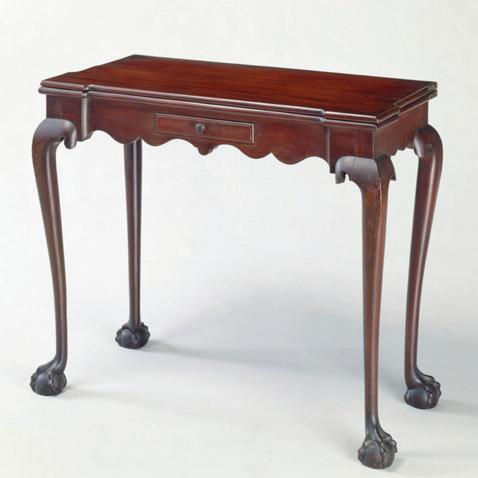
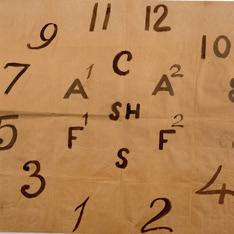
Part three of this year-long exhibition explores an eclectic cross section of the visual and material culture found in the MHS collection.
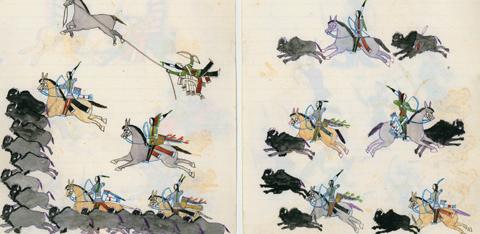
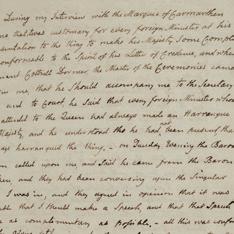
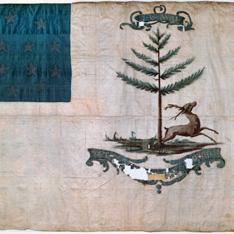
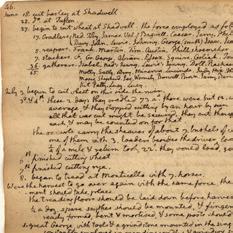
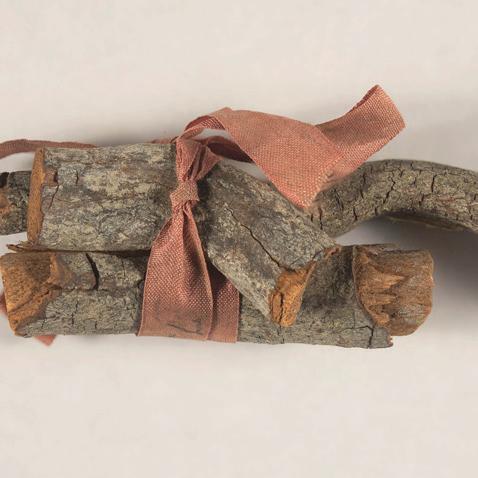
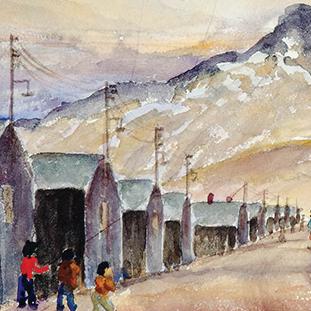
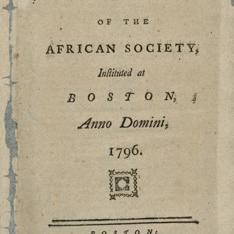
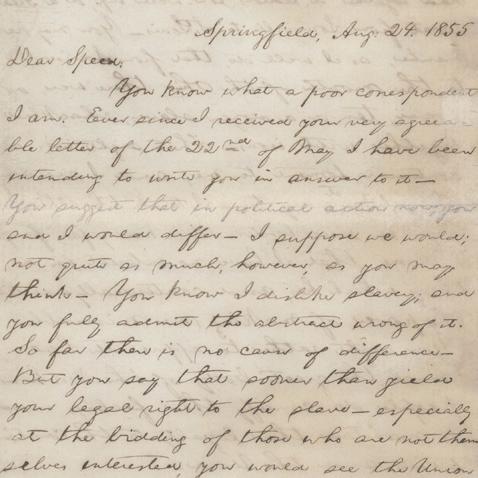
Visit in Person
Monday, and Wednesday through Friday, from 10:00 AM to 4:45 PM Tuesday from 10:00 AM to 7:45 PM Saturday from 10:00 AM to 3:00 PM
Explore the virtual exhibition at www.masshist.org/ourfavoritethi ngs
